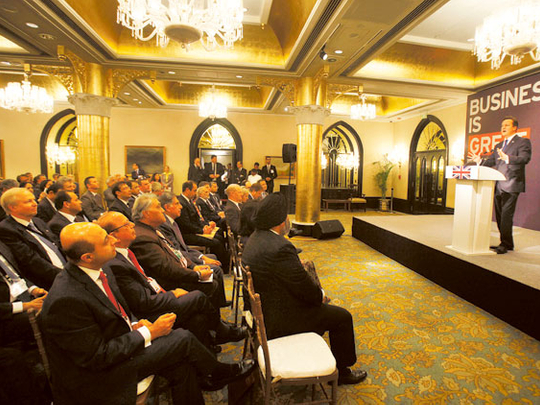
Mumbai: British Prime Minister David Cameron said on Monday he wanted his country’s companies to help India develop new cities and districts along a 1,000 km (600 mile) corridor between Mumbai and Bangalore, generating investment projects worth up to $25 billion.
Kicking off a three-day visit to India with the largest trade delegation taken abroad by a British prime minister, Cameron said he wanted British firms to work with the Indian and British governments to develop nine districts to link Mumbai, India’s financial capital, with Bangalore, its tech hub.
“With me I’ve got architects, planners and finance experts who can work out the complete solution,” he told an audience of business people and workers at Hindustan Unilever Limited.
“It would unleash India’s potential along the 1,000 km from Mumbai to Bangalore, transforming lives and putting British businesses in prime position to secure valuable commercial deals.”
India should open up its markets to allow foreign direct investment in hitherto closed sectors, he added.
His office said forecasts showed 5.8 percent of India’s population growth would be in the corridor, contributing 11.8 percent of the country’s gross domestic product growth by 2020.
The first phase of the project would involve investment in physical infrastructure, such as transport networks, telecommunications and power generation. Later construction would concentrate on social infrastructure such as welfare and education.
India has pushed the building of giant development “corridors” to accelerate the growth of its manufacturing base, which has lagged behind its IT and services industry.
The government has also planned to build 24 new industrial cities along a 1,483 km (920 mile) railway line between New Delhi and Mumbai with Japanese funding, but the project has progressed slowly.
Cameron’s office said British and Indian officials had been working with business representatives from the two countries on the Mumbai-Bangalore project since last year and had produced an initial assessment of its scale and potential.
The British government would be willing to co-fund a feasibility study, on a match funding basis, with the Indian government costing up to 1 million pounds ($1.55 million).
By 2030, if realised, the project could generate close to half a million jobs, while indirect jobs could bring the total in the region to two million, Cameron’s office said.
“Our initial scoping work suggests that accommodating the 3-4 million people attracted to each of the new cities would require close to 1 million new homes, up to 120 schools, 10 colleges and hospitals,” the office said.
Cameron also said Britain planned to change the visa system to allow Indian business people to get a visa in one day.
Cameron is seeking to revive Indian interest in the Eurofighter Typhoon, the next generation of jet fighters made in part by BAE Systems Plc, as authorities in New Delhi continue talks to buy 126 Dassault Aviation SA Rafale planes from France. A Rafale contract wasn’t signed during French President Francois Hollande’s Feb. 14-15 visit to India.
“Typhoon is a superior aircraft,” Cameron told reporters, saying that some planes could be built “within months.” He added that “we also have very interesting offers in terms of industrial participation, technology transfer and the company has said they can look again at price.”
With economies in Europe struggling, Cameron said Britain needs to boost exports to developing nations such as India. “I am a great believer that you have got to fill up aeroplanes with business people, get out to these fast-growing countries and sell your country as hard as you can,” he said.
Cameron travels to New Delhi on Tuesday to meet Prime Minister Manmohan Singh and President Pranab Mukherjee. He will push for greater access to the Indian market, particularly in the insurance industry and will seek to help move forward an EU- India free-trade agreement.
The premier will also seek to reassure Indian leaders that Britain will remain a member of the European Union, saying that skepticism among his Conservative Party and the electorate needs to be tackled.
“The reality is that people were already questioning Britain’s commitment to the EU,” Cameron said in an interview with the Hindustan Times. “What we need to do is tackle this issue head-on and agree a changed settlement.”
Efforts to tighten controls on students coming to the UK from nations like India will also be discussed. Cameron told the Hindustan Times “there is no limit to the number of students who come from India,” provided they have a place at an established university and speak English.
He said there’s also no cap on the number of students who can stay and work in Britain in a graduate job.
“There’s more we can do here, and that’s an area where I hope we can put an even more attractive offer on the table during this trip,” the prime minister said, without giving more details.












